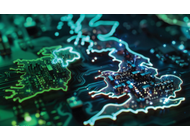- Date 11 Jan 2018
Low cost, multispectral imaging technology provides in-depth skin analysis to create truly personalised recommendations for consumers in-store and at home
Skintuition now helps consumers to identify the exact shades of concealer and foundation to hide blemishes in their skin, based on their natural skin colour and the lighting conditions they want to look their best in – whether that’s in daylight or under fluorescent lighting when out at night.
This multi-spectral imaging technology can revolutionise the consumer experience across cosmetics, personal care and consumer healthcare, with the ability to measure and advise on conditions such as skin dryness or acne, and the effects of ageing. In addition to conducting a one-off analysis of the consumer’s skin condition, to aid with purchasing decisions in store or which products to apply at home, the technology enables consumers to monitor changes over time, including the impact that their products are having on their skin. Tomorrow’s consumers might assess the reduction of fine lines or improvements in skin hydration over time, using these insights to adjust their skincare routines for the best results.
The technology can be embodied as a low cost smartphone accessory for use at home – a simple clip on device for consumers’ smartphones – or as a countertop tablet for in-store use.
The personalisation trend is taking the consumer goods industry by storm, with optical technologies increasingly making their way onto cosmetics counters. Embedded with colour and texture sensors, these systems are capable of colour matching foundations and concealers to individual skin tones. However, today’s optical systems typically use one of two approaches: analysing only a small area of skin with an expensive but highly functional device, limiting its use to high end brands and department stores, or using a smartphone camera-based app, whose functionality will always be limited by the data that can be obtained by the smartphone camera alone.
By capturing a multi-spectral image of a large area on the body, as opposed to capturing a spot measurement, the system becomes non-contact, improving the user experience. The system simulates a range of lighting scenarios, allowing consumers to optimise their look, whether they plan to use the cosmetic product outside under direct sunlight, in overcast conditions or indoors under artificial lighting. Because the additional hardware is simply a selection of different wavelength LEDS, with advanced algorithms performing the image processing, the cost can be very low.
“Consumers are demanding increased personalisation. In cosmetics and consumer healthcare products there is a need to understand the consumer before a truly personalised product can be recommended,” said Edward Brunner, Head of Asia Consumer Business at Cambridge Consultants. “Current solutions either involve expensive hardware, or are limited in the quality and accuracy of the data they can obtain. Our multi-spectral imaging approach bridges the gap, generating valuable information on a consumer’s skin by combining a low cost device with smartphones and tablets”.
Cambridge Consultants will be demonstrating Skintuition at CES 2017, January 9-12, in Las Vegas at the Sands Expo, Level 2, Halls A-D stand 44137.



